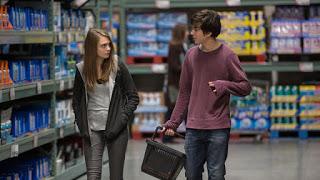 Besides Taylor Swift, young adult novel adaptations are the closest thing I have to a guilty pleasure. This summer features another John Green weepy, not nearly as good as last year's. Jake Schreier's Paper Towns is a sloppy mess that doesn't come together until the third act.
Besides Taylor Swift, young adult novel adaptations are the closest thing I have to a guilty pleasure. This summer features another John Green weepy, not nearly as good as last year's. Jake Schreier's Paper Towns is a sloppy mess that doesn't come together until the third act. Quentin Jacobsen (Nat Wolff), Q to his friends, is a loser teen infatuated with bad girl Margo Spiegelman (Carla Delevgine). One night, Margo brings Quentin along on a revenge spree against her cheating boyfriend and other jerks. The next day, Margo disappears, and Q becomes obsessed with finding her. Following her clues around Orlando, Q enlists his friends Ben (Austin Abrams) and Radar (Justice Smith), and Margo's friend Lacey (Halston Sage), on a quest leading them to upstate New York.
Most of Paper Towns is clunky garbage. Quentin and Margo's rampage seems creepy rather than endearing, and Margot exiting immediately afterwards doesn't help. Margo is another free spirit who talks like a stoned philosophy grad student and confuses irresponsibility with liberation. Q slavishly follows her lead, and that's the problem: he's less developing teen than an empty vessel for lusty obsession. Near the end, Q earnestly tells us that Margo isn't a construct but a real girl, yet Towns hasn't invested enough in Margot to earn this weighty conclusion.
Afterwards, Quentin chases esoteric clues which inadvertently teach him how to live life by crashing parties and burglarizing ghetto thrift shops. This leads to some cute scenes, like Quentin and friends singing the Pokémon theme song to overcome fear, but more often stilted or cringe-worthy ones (a "meaningful" bathtub conversation). The cast is engaging enough, with Justice Smith as Q's nerdy friend and Halston Sage as the school slut with hidden depths standing out. But Paper Towns spends too much time chasing its own tail, its ostensibly moving or funny scenes anything but.
After 80 minutes of wheel-spinning, Paper Towns belatedly embarks an epic cross-country road trip. Here the film finally comes alive: there's a clear narrative goal, characters actually develop depth and chemistry, the jokes start being funny and there's a bittersweet payoff. This segment is so well-done, you wonder why the hell Green bothered with the clunky, unengaging set-up? Rewrite Paper Town to focus on the road trip, and you've got an excellent coming-of-age movie.
Last year's John Green adaptation, The Fault in Our Stars, lost sight of its effective central relationship amidst improbable globe-trotting and other sidetracks. Conversely, Paper Towns could have benefitted from expanding its horizons. Fair enough that Green planned a mundane story with an unorthodox payoff. But why make the build-up so boring?

